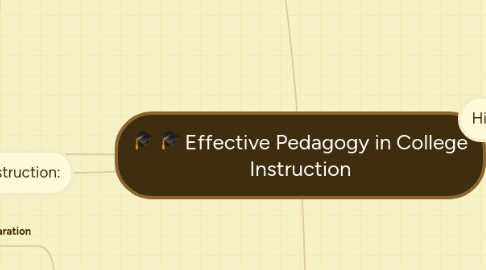
1. Prescriptive: Little or no input from students concerning objectives or methodology of teaching
1.1. Introduces topic at hand
1.2. Reviews Instructional objective & offers a preview of the activities to follow
1.3. Provides exposure to the material
1.4. Allows for Questions & Answers for clarification
1.5. Allows students to demonstrate their level of mastery of the material.
1.6. Provides an opportunity for application.
2. The Context of College Inst.
2.1. Institutional Setting
2.1.1. Community College
2.1.2. Technical College
2.1.3. Liberal Arts College
2.1.4. School of Arts & Sciences
2.1.5. Professional School
2.2. Time Frame
2.2.1. Community College: 2 yrs
2.2.2. Technical College: 2, 4 yrs.
2.2.3. Liberal Arts: 2, 4, 5-6 yrs
2.2.4. School of Arts & Sciences: 4, 5-6, 6+ yrs
2.2.5. Professional Schools: 5-6, 6+
2.3. Level of Instruction
2.3.1. Basic: Associate & Bachelor's= Undergraduate
2.3.2. Intermediate: Master's= Applied to a single discipline
2.3.3. Advanced: Doctorate= Information Generation
3. Modes of College Instruction:
3.1. Collaborative: Combination of class seminar & diaglogue
3.1.1. Qualitative
3.1.2. Complementary
3.1.3. Proportional
4. Phases of College Instruction
4.1. Pre-engagement: Education Preparation
4.1.1. Needs Assessment
4.1.2. Diagnostic Activities
4.1.3. Development of Instructional Objectives
4.1.4. Instructional Module Development
4.2. Engagement Phase: Educator Involves the student
4.2.1. Situational Assessment
4.2.2. Module implementation
4.2.3. Formative evaluation
4.2.4. Crisis Intervention
4.3. Post-Engagement Phase: Educator assesses effectiveness of teaching-learning effort
4.3.1. Summative evaluation
4.3.2. Student remediation
4.3.3. Methodological revisions
